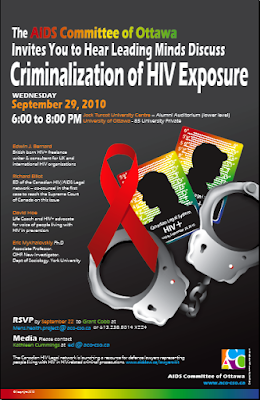Press Release: HIV Advocacy Group Launches Positive Justice Project To Fight Stigma and Discrimination by Repealing HIV-specific Criminal Statutes
The Positive Justice Project, a campaign of the Center for HIV Law and Policy, was launched this week to combat HIV-related stigma and discrimination against people with HIV by the criminal justice system. A day-long organising meeting, held September 21st in New York, included more than 40 participants from legal, government, grant-making and community service organisations.
The focus of the Positive Justice Project is the repeal of “HIV criminalisation” statutes — laws that create HIV-specific crimes or which increase penalties for persons who are HIV-positive and convicted of criminal offences.
The Positive Justice Project is the first coordinated national effort in the United States to address these laws, and the first multi-organizational and cross-disciplinary effort to do so. HIV criminalisation has often resulted in gross human rights violations, including harsh sentencing for behaviors that pose little or no risk of HIV transmission, including:
- A man with HIV in Texas who is now serving 35 years for spitting at a police officer;
- A man with HIV in Iowa, who had an undetectable viral load, was sentenced to 25 years after a one-time sexual encounter during which he used a condom;
- A woman with HIV in Georgia, who was sentenced to eight years imprisonment for failing to disclose her viral status, despite it having been published on the front page of the local newspaper and two witnesses who testified her sexual partner was aware of her HIV-positive status;
- And a man with HIV in Michigan who was charged under the state’s anti-terrorism statute with possession of a “biological weapon,” after an altercation with a neighbour.
In none of the cases cited was HIV transmitted. Actual HIV transmission—or even the intent to infect—is rarely a factor in HIV criminalisation cases.
Instead, most prosecutions are not for HIV transmission, but for the failure to disclose one’s HIV status prior to intimate contact, which in most cases comes down to competing claims about verbal consent that are nearly impossible to prove. Anti-criminalisation advocates support prosecution only in cases where the intent to harm can be proven.
HIV criminalisation undercuts the most basic HIV prevention and sexual health message, which is that each person must be responsible for his or her own sexual choices and health. Criminalisation implies a disproportionate responsibility, providing an illusion of safety to the person who is HIV-negative or who does not know his or her HIV status.
As a result, ignorance of one’s HIV status is the best defence against prosecution in these cases, ultimately providing a disincentive to testing and self-awareness. Only by getting an HIV test and knowing one’s HIV status is one subject to arrest and prosecution. This flies in the face of established evidence that it is those who are untested – i.e., those who are safe from prosecution – who most frequently transmit HIV.
Research has demonstrated that HIV criminalisation statutes do nothing to reduce HIV transmission and, in fact, because they further stigmatise already-marginalised populations and discourage HIV testing, they may contribute to further HIV transmission.
The Center for HIV Law and Policy also this week released a draft of the first detailed analysis of HIV-specific laws and prosecutions in all 50 states, U.S. territories and the military. With more than 400 prosecutions to date, the U.S. has had more HIV-specific criminal cases than any other nation on earth.
According to the Positive Justice Project organisers, the challenge of repealing laws that punish people on the basis of their HIV status cannot be met without:
- Broader public understanding of the stigmatising impact and negative public health consequences of criminalisation statutes and prosecutions that are perpetrated under their guise;
- Greater community consensus on the appropriate use of criminal and civil law in the context of the HIV epidemic;
- Clear, unequivocal leadership and statements from federal, state and local public health officials on the causes and relative risks of HIV transmission and the dangers of a punitive response to HIV exposure and the epidemic;
- And a broader and more effective community-level response to the ongoing problem of HIV-related arrests and prosecutions.
“Misperceptions about the routes and risks of HIV transmission continue to fuel fear and myths about people with HIV that leads to lower acceptance of HIV testing and greater stigma and discrimination. Nearly 30 years into the epidemic, people still fear contact with people with HIV, working with them or allowing them near their children,” said Catherine Hanssens, the founder and executive director of the Center for HIV Law and Policy.
“HIV-specific laws have created a viral underclass. There is no more extreme manifestation of stigma than when it is enshrined in the law,” said Sean Strub, who has lived with HIV for more than 30 years. Strub is a senior advisor with the Center for HIV Law and Policy and joined in launching the Positive Justice Project.
Vanessa Johnson, a Positive Justice Project planning committee member and Executive Vice President of the National Association of People with AIDS, said, “When the government uses the fact of a person’s HIV test and subsequent result to turn around and encourage prosecution of that person for behavior that otherwise is legal for people who are untested, it engages in dangerously confusing double-speak that undermines the very HIV testing and prevention goals it claims to prioritize.”











